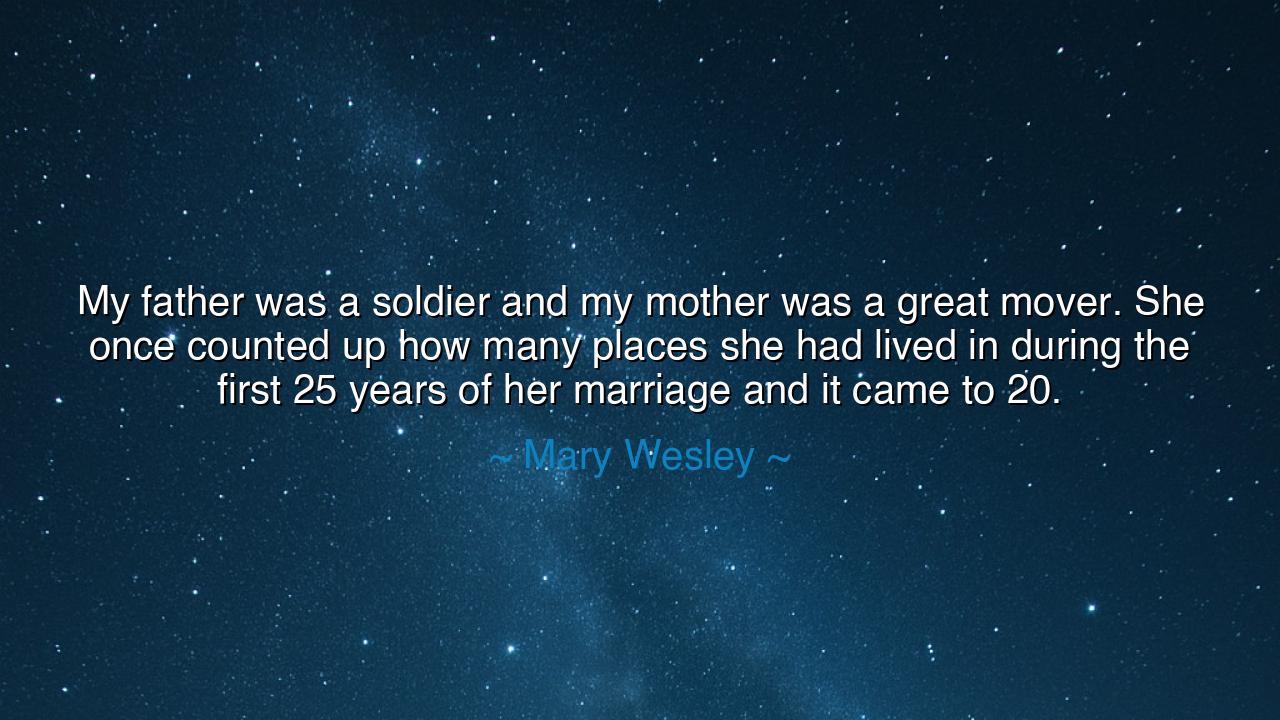
My father was a soldier and my mother was a great mover. She once
My father was a soldier and my mother was a great mover. She once counted up how many places she had lived in during the first 25 years of her marriage and it came to 20.






Listen, O Children of the Future, to the words of Mary Wesley, whose reflection on the lives of her parents offers a deep insight into the life of movement, sacrifice, and change: "My father was a soldier and my mother was a great mover. She once counted up how many places she had lived in during the first 25 years of her marriage and it came to 20." In these words, Wesley speaks to a life marked by constant change—one shaped by the demands of war and the personal sacrifices of her mother, whose journey was defined by relocation and adaptation. The soldier's life is often one of duty, loyalty, and sacrifice, while the life of the mover is one of constant transformation, of being unmoored from place and comfort, yet adaptable to the shifting winds of fate.
In the ancient world, warriors were revered not just for their valor but for their role in the endless movement of armies across vast landscapes. Alexander the Great, in his campaigns to conquer the known world, did not simply fight battles—he led his soldiers through lands of war and upheaval, shifting territories, cultures, and allegiances. His was a life of constant movement, shaped by purpose and duty. Yet, as Alexander’s soldiers ventured far from home, many were forced to reckon with the cost of this constant motion—the loss of connection to family, to roots, to the places that could offer them peace. In the same way, Wesley’s father, a soldier, lived a life of unsettlement, one where each victory or defeat carried with it the toll of separation and displacement.
Consider, too, the tale of Odysseus, the great hero of the Iliad and Odyssey, whose journey was defined by constant wandering and struggle to return home. Odysseus spent years away from his family, facing storms, myths, and battles on his journey to Ithaca. Penelope, his wife, lived in a state of waiting and endurance, much like Wesley’s mother, who, though she was not physically at war, was engaged in a battle of her own—a battle against the turbulence and uncertainty of constantly shifting her home, her family, and her life. The mover, like Penelope, must learn to adapt, to endure, and to remain strong in the face of change, knowing that the long-term stability of family and home often comes at the cost of personal sacrifice.
The life of Mary Wesley’s mother is a story not just of physical movement but of emotional resilience. To move twenty times in twenty-five years is not just a matter of physical relocation; it is a reflection of the inner strength required to leave behind what is familiar, to constantly rebuild, and to reshape one’s identity and sense of home in a new place. There is something deeply heroic in this, for in each move, there is the promise of new beginnings, but also the loss of roots and the unsettling feeling of impermanence. In the same way that Odysseus’ journey was filled with both the excitement of discovery and the pain of separation, so too must the mover learn to find peace in transience, and to build strength in places that may never feel like permanent shelter.
The lesson, O Children, is clear and profound: Movement and change are inevitable parts of life, but they do not have to lead to loss or disconnection. Mary Wesley’s mother embodied the wisdom of adaptability, learning how to find a sense of home even when home was constantly shifting. The soldier’s life, too, is one of constant change, yet it is also one of duty, commitment, and the willingness to sacrifice for a greater cause. Whether in war or in peace, we must recognize that home is not just a place—it is a state of being that we carry with us, and we can create it even amidst constant change.
In your own life, remember this: Life will move you. You will face challenges, transitions, and times when you must leave behind what is familiar to embrace the unknown. Like Wesley’s mother, you may find yourself in situations where stability feels fleeting. Yet, in every move, in every change, you have the power to build a new home, to find peace in places that may seem unfamiliar, and to bring strength to those around you. Let your resilience be your guide as you navigate the ever-changing landscape of life. Embrace change as an opportunity for growth and reinvention, knowing that home is not just a place, but a sense of purpose, a community, and a resolve that you carry with you wherever you go. And, like the ancients, remember that even in the midst of constant movement, you can always find a way to stay rooted in what matters most.






AAdministratorAdministrator
Welcome, honored guests. Please leave a comment, we will respond soon